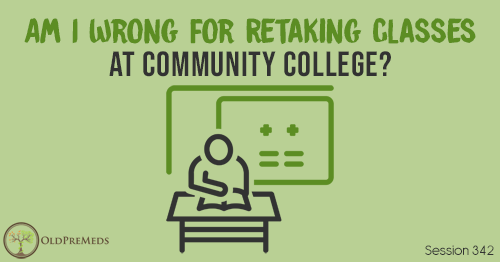Apple Podcasts | Google Podcasts
Session 338
The student is currently in their fourth gap year and left a counseling graduate program midway through because they realized they wanted to pursue medicine instead. How will medical schools look upon this?
Questions answered here on the podcast are taken directly from premedhangout.com. Go ask your questions there and use #OPMquestion.
Also, please be sure to check out all our other podcasts on Meded Media as we try to bring you as many resources as you need on this journey.
Listen to this podcast episode with the player above, or keep reading for the highlights and takeaway points.
The MCAT Minute
The MCAT Minute is brought to you by Blueprint MCAT.
- Your time is undeniably valuable as a nontraditional premed student and you may have various commitments that compete for your attention. It’s crucial to optimize your study schedule to accommodate your career, family, and other responsibilities.
- Check out Blueprint MCAT and sign up for a free account to access their study planner tool. This tool allows you to create a customized study plan that aligns with your unique circumstances and ensures maximum efficiency and effectiveness.
- Take advantage of this free study planner tool to establish a schedule that works best for you, taking into account all your nontrad premed obligations.
OldPreMeds Question of the Week
“I’m currently in my fourth gap year since graduating undergrad two years ago. I started a counseling graduate program. A year into it, I left because I knew deep down that that is not what I wanted to do. And I wanted to pursue medicine.
Again, I was premed and undergrad, but then encountered a lot of self-doubt regarding the MCAT and getting into medical school, which led me to try out the two-year counseling graduate program. I left midway through the program to avoid spending additional money when I knew that medicine is really what I’m passionate about.
I’m worried schools are going to look at that negatively. I’m wondering if I should bring it up in my application beyond the submission of my transcripts? Or do I stick to my postbac, work on prereqs I’ve taken at community colleges, and clinical lab work I have done?”
Embracing Uncertainty and Communicating Intent
Navigating the decision to leave a program in favor of pursuing medical school is a common dilemma faced by many students. When you find yourself longing to be in a different place, the fear of what leaving might entail can be daunting. It’s important to acknowledge that the outcome of this decision is uncertain, and it’s beyond your control. In this situation, focus on what you can control: your actions and how they are perceived by others.
“The only thing you’re in control of is what you do… This person reviewing your application is not in your control.”
Communicating Your Journey in Personal Statements
While the application reviewers hold the power to evaluate your journey, you can strategically position your experiences and intentions in personal statements and essays. Take advantage of opportunities such as secondary prompts that ask about your post-graduation endeavors, allowing you to provide context for your decision.
Addressing Concerns of Hopping Around
One common concern is the fear that leaving a program may be seen as indecisiveness or hopping around without a clear path. To address this, your personal statement should unequivocally communicate your dedication to the field of medicine. It should leave no room for doubt, expressing your unwavering commitment and conviction.
Crafting a Convincing Personal Statement
It’s essential to recognize that the question of trust and certainty is not unique to your situation. All applicants face scrutiny regarding their chosen path.
Your personal statement serves as a powerful tool to answer this question and leave a lasting impression. Craft a personal statement that powerfully communicates your passion, drive, and clarity of purpose. By doing so, you aim to evoke a response from the reader that says, “I get it.”
Embrace the uncertainty of the outcome and focus on presenting a compelling narrative that showcases your genuine desire to pursue a career in medicine.
The Power of Personal Statements
During a recent Application Academy group advising session, one student shared her experience of struggling with the “why medicine” question during a medical school interview. Despite having crafted a fantastic personal statement that clearly conveyed her passion for becoming a doctor, the interviewer paused and questioned why she was finding it challenging to answer.
The student was taken aback by this unexpected interruption but soon realized that the interviewer was merely seeking to engage in a meaningful conversation. This incident highlights the importance of personal statements in showcasing one’s motivations and aspirations. It also emphasizes the need for interviewers to dig deeper into an applicant’s motivations.
“Your personal statement should ultimately help the reviewer go – this person wants to be a doctor.”
Prioritizing Passion over Sunk Costs in Pursuit of Medicine
It is crucial to acknowledge that transitioning from a different program to medicine is not fundamentally different from an undergraduate student trying to prove their dedication to the medical field.
In such situations, my recommendation for students is clear: leave the current program you’re in. Cease wasting your resources, both financial and personal, on a path that ultimately does not align with your true aspirations.
I firmly believe in recognizing the sunk cost fallacy, where individuals may think, “I’m already a year into this two-year program, so I might as well finish it.” However, it is essential to disregard such notions and embrace the fact that it’s alright to quit.
If your ultimate goal is to attend medical school, then you do not need to be in a counseling program. While participating in a counseling program may potentially benefit you as a future physician, it is not a prerequisite for getting into medical school. Therefore, if your heart is not in it, do not pursue it, especially if financial constraints are a concern.
Focusing on Passion and Motivation on Your Personal Statement
In your personal statement for medical school, it’s important to focus on why you want to be a doctor. Don’t get too caught up in discussing the detour or deviation you took along the way. It may be significant to mention a pivotal moment where you overcame self-doubt and chose to pursue medicine despite taking a detour in a counseling program. But it doesn’t have to be a major part of your application.
“Ultimately, your goal in your application/personal statement, specifically is: Why do you want to be a doctor?”
Your personal statement should emphasize your passion for medicine and your determination to overcome challenges like imposter syndrome. It’s not necessary to delve into every detail of why you made certain choices or justify your path extensively. Instead, prioritize sharing your genuine motivation for becoming a doctor and how your experiences have shaped your commitment to this career path.
Exploring Impactful Experiences and Crafting a Holistic Narrative
When completing the AMCAS application, it is worth considering whether to mention the detour or deviation you took in the potentially impactful experiences essay. Although it is not obligatory, this essay can provide an opportunity for you to share relevant aspects of your journey.
However, the personal statement remains the primary platform to articulate your path to becoming a physician. Then you can highlight the pivotal moment that brought you back to medicine after your detour. This is where you can explain why you made the decision to pursue medical school.
Additionally, secondary essays will likely present multiple chances. Depending on the prompts, you may discuss the reasons behind your detour, the lessons learned, and other insights gained from your experience.
Overcoming Fear in Pursuit of a Medical Career
When considering the decision to leave a graduate program and pursue medicine, it’s natural to fear being perceived as a quitter. However, it’s important to address this concern head-on in your application. By sharing your experiences and story, you can convey the realization that your true calling lies in becoming a doctor.
Craft your narrative in a way that enables admissions committees to understand and empathize with your decision to leave the program. Demonstrating your passion for medicine and presenting a thoughtful and well-supported rationale will alleviate any concerns they may have about your commitment. Instead of portraying a hasty choice to enter the counseling program as a quick fix due to MCAT or med school doubts, provide substantial evidence supporting your genuine desire and determination to excel in medical school.
Through your narrative, show them why you belong in medical school and why you will thrive in this challenging field.
Expert Guidance for Non-Traditional Students
If you’re seeking assistance in shaping your unique journey towards medical school, the dedicated team at Medical School HQ is here to help. With a focus on supporting non-traditional students, our advisors are experienced in helping students craft their compelling stories. Whether you require interview preparation, essay feedback, or comprehensive advising services, visit medicalschoolhq.net/advising to access the resources you need for successful medical school admissions.
Additionally, don’t miss out on the Study Planner Tool provided by Blueprint MCAT at blueprintmcat.com. This free tool is designed to optimize your study efficiency, ensuring you make the most of your preparation. Trust us to provide the guidance and tools necessary to navigate the path to medical school for both pre-med students and non-traditional applicants alike.












